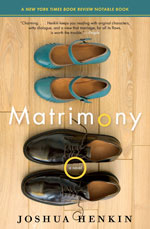 We're pleased to introduce a new regular contributor here at ReadingGroupGuides.com: novelist and creative writing professor Joshua Henkin.
We're pleased to introduce a new regular contributor here at ReadingGroupGuides.com: novelist and creative writing professor Joshua Henkin.Have you ever wondered what it's really like for authors to meet with book clubs and talk about their works? Josh regularly visits with reading groups --- in person and over the phone --- to discuss his novel Matrimony, and each month he'll be sharing behind-the-stories about what took place.
Check back tomorrow for more on Josh's book club adventures. And to read a guest post he previously wrote for us about Matrimony, click here.
November was a busy month: I talked to eight book groups about my novel Matrimony. Below are the relevant statistics, followed by a series of observations, some more whimsical than others, about my travels this month in the land of book group.
November's Statistics
1) New York City Book Group: 13 Participants; 1 Facilitator; Estimated Average Age: Mid-Sixties; Number of Women: 14; Number of Men: 0; Distance traveled: 21.08 miles roundtrip (32 subway stops).
2) Brooklyn Book Group: 13 Participants; Estimated Average Age: 60; Number of Women: 12; Number of men: 1 (hostess's husband). Distance Traveled: 10 blocks walking roundtrip.
3) Princeton, NJ, Library Book Group: 12 Participants. Estimated Average Age: Late Sixties. Number of women: 11; Number of Men: 1 (John). Distance Traveled: 102.78 miles roundtrip.
4) New York City Book Group: 10 Participants; 1 Facilitator; 1 Gorgeous Upper East Side Townhouse; Estimated Average Age: 50. Number of Women: 11; Number of Men: 0; Distance Traveled: 19.94 miles roundtrip (28 subway stops).
5) Cosmopolitan Club Book Group (New York City): 17 Participants; Estimated Average Age: 55; Number of Women: 17; Number of Men: 0; Number of free dinners at the Cosmopolitan Club Restaurant: 1; Number of male authors seen on the premises of the all-women's club: 1. Distance Traveled: 17.82 miles roundtrip.
6) Florida Book Group: 8 Participants; Estimated Average Age: On the phone, so I couldn't tell; Number of Women: 8; Number of Men: 0; Distance traveled (12 feet roundtrip, from desk to phone and back again).
7) Atlanta Book Group: 6 Participants; Estimated Average Age: 40 (judging from when they said they graduated from college); Number of Women: 6; Number of Men: 0; Distance Traveled: 12 feet roundtrip.
8) Englewood, NJ, Book Group: 14 Participants; Estimated Average Age: Late Thirties; Number of Women: 14; Number of Men: 0; Number of Free dinners at excellent Indian Restaurant: 1; Distance Traveled: 38.66 miles roundtrip. Amount of traffic crossing the George Washington Bridge: Lots.
November's Most Commonly Asked Book Group Question: Is your novel autobiographical?
A lot of my writer friends dislike this question, and we writers get asked it all the time. My friends think the question is prying, and they don't believe it's relevant to the quality of their work. It may not be, but it seems to me an understandable question --- particularly when you're visiting a book group and have therefore consented to enter the living rooms of your readers. Novelists, of all people, are voyeurs (to my mind, a good writer needs to be a gossip), so why shouldn't readers be voyeurs as well? Readers want to know if they're meeting the walking, breathing embodiment of the characters they've read about.
What does interest me, however, is the response I get when I tell my readers the truth --- that Matrimony isn't autobiographical; that none of the events in the book happened to me; that despite sharing a first initial with him, I'm not Julian, the male protagonist of my novel; that, with the exception of the dog, none of the characters are based on actual mammals I know. The response I usually get is some polite version of Oh, come on. Almost every writer I know has this experience, whether or not they visit book groups. It frustrates some of them, but I actually think that when readers assume your work is autobiographical, when they continue to insist on it even when they've been told it's not, it's generally good news for the writer. It's a sign that the reader found the characters real enough, true enough, vivid enough that they're sure they must be based on real people. How else, after all, could we have created them?
The fact is, we create them by imagining them, often over many years (in my case, ten years: that's how long it took me to write Matrimony, and I threw out more than three thousand pages along the way). The last thing I'd want to do is spend ten years writing about myself: what could be more boring? I want to meet new people, and writing fiction is one way to do that. I don't mean to be naive. Anything a novelist writes says something about him or her, and so in some loose and hard-to-pinpoint way all fiction is autobiographical. But the key words are "loose" and "hard to pinpoint." It's like being asked whether your dreams are autobiographical. Almost by definition they are: you had them. But what happens in your dreams is usually so different from what happens in your actual life that it's hard to draw a simple connection between the two. The same goes for the relationship between fiction and the author's life. I actually think fiction is very revealing of the novelist, but the way in which it's revealing is far more complicated than "autobiography" implies. In fact, I would suggest, paradoxically, that the more narrowly autobiographical a novel is the less it tells you about the writer. The facts as they actually happened are pale things; it's what the writer imagines --- what s/he makes up --- that tells you a lot more about him or her.
Check back tomorrow for the 2nd most commonly asked question, some unusual questions, and more.
---Joshua Henkin

